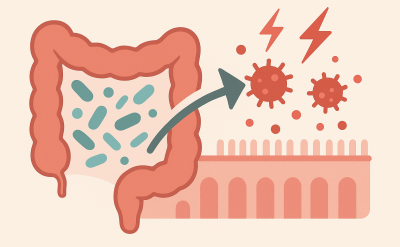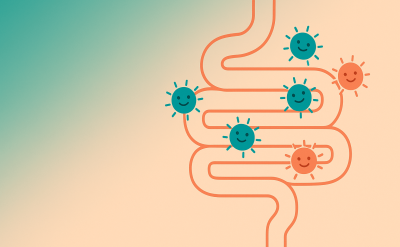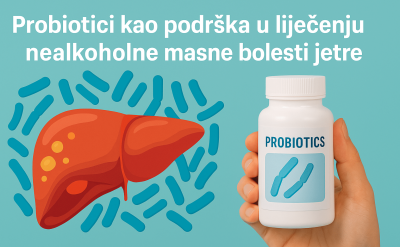How Friendly Bacteria Soothe IBS, Bloating and More
Functional digestive disorders such as Irritable Bowel Syndrome (IBS), functional dyspepsia and chronic bloating are becoming increasingly common, affecting up to one in four adults globally. Although these conditions are not life-threatening, they often lead to persistent discomfort, disrupted routines, and reduced quality of life. What makes them particularly frustrating is the fact that they typically present without clear structural or biochemical abnormalities, leaving many patients in search of effective, lasting solutions.

The Role of the Gut Microbiome
In recent years, science has shifted its focus toward the gut microbiome as a key player in these disorders. Your gut hosts trillions of microorganisms, many of which are essential for digestion, immunity, and even mood regulation. When the delicate balance of these microbes is disrupted—a condition known as dysbiosis—it can lead to increased gut sensitivity, irregular bowel movements, inflammation, and a cascade of symptoms commonly associated with IBS and related conditions.
What Are Probiotics?
Probiotics, defined as live microorganisms that, when administered in adequate amounts, confer health benefits to the host, have emerged as a natural, evidence-based approach to alleviating these digestive issues. Unlike medications that primarily mask symptoms, probiotics aim to correct the underlying imbalances within the gut ecosystem.
Common Functional Gastrointestinal Disorders
Functional gastrointestinal disorders (FGIDs) include conditions like IBS, functional dyspepsia, functional constipation, and unexplained bloating. These disorders are diagnosed based on symptom patterns, using criteria such as the internationally recognized Rome IV guidelines. Patients often report abdominal pain, gas, changes in stool consistency, and digestive discomfort without any observable damage during endoscopy or imaging.

Root Causes and Triggers
The pathophysiology behind FGIDs is complex and multifactorial. One of the core mechanisms is the dysfunction of the gut–brain axis—a two-way communication system linking the enteric nervous system of the gut with the central nervous system. This connection can become hypersensitive due to stress, infection, or trauma, leading to exaggerated pain perception, altered motility, and emotional symptoms like anxiety or depression.
Another major contributor is an imbalanced gut microbiota. Healthy gut bacteria help break down fibers into anti-inflammatory compounds, protect against harmful microbes, and support immune function. However, in individuals with digestive disorders, studies consistently reveal reduced microbial diversity and an overgrowth of gas-producing or pro-inflammatory bacteria. This imbalance can increase intestinal permeability (leaky gut), elevate local inflammation, and trigger discomfort.
Psychological stress is also a significant factor, often worsening gut symptoms. Early life trauma, chronic stress, and burnout syndrome are linked to more severe manifestations of FGIDs. These factors don’t directly cause the disorders but influence how the body perceives and responds to symptoms.
In many cases, FGIDs can also be triggered by infections. A subset of patients develop symptoms after acute gastroenteritis, in what is known as post-infectious IBS. The immune system's lingering response to bacteria like Campylobacter or Salmonella can cause persistent alterations in gut function.
Moreover, food sensitivities and lifestyle factors play a role. For instance, high-FODMAP foods (fermentable carbs), dairy, fried foods, caffeine, and alcohol are common symptom triggers. Irregular sleep and sedentary habits further exacerbate issues.
How Probiotics Help
So, how exactly do probiotics help? Probiotics support gut health by restoring microbial balance, strengthening the gut lining, modulating the gut–brain axis, and normalizing bowel movements. Clinical studies show that specific strains of probiotics can significantly reduce abdominal pain, bloating, and irregular stool patterns.
For IBS sufferers, strains such as Bifidobacterium infantis 35624 and Lactobacillus plantarum 299v have shown consistent benefits. They work by calming hypersensitive nerve endings, reducing gas production, and improving overall gut motility. In people with functional dyspepsia, combinations of Lactobacillus and Bifidobacterium strains have been found to ease symptoms like early satiety and post-meal bloating by regulating stomach acidity and gastric emptying.
Patients with chronic functional constipation may benefit from strains like Bifidobacterium lactis HN019 and Lactobacillus casei Shirota, which help accelerate intestinal transit and improve stool consistency. These effects are typically observed after four to eight weeks of daily supplementation.

Choosing the Right Probiotic
t’s important to note that not all probiotics are created equal. Their effectiveness depends on the strain, dosage, and duration of use. Most research supports daily intake of at least 10 billion CFU (colony-forming units) for four to eight weeks. And because every gut is unique, some trial and error may be necessary to find the optimal formula for each individual.
Safety and Usage Tips
Probiotics are generally well tolerated and safe for long-term use in healthy individuals. Minor side effects like bloating or loose stools may occur initially but usually resolve within a few days. However, people with severely weakened immune systems should consult a healthcare provider before beginning supplementation.
For best results, choose a probiotic supplement with clinically validated strains and take it consistently. Combine it with a gut-friendly diet rich in prebiotic fiber, stay hydrated, manage stress levels, and get adequate sleep. These simple changes, together with targeted probiotic use, can make a significant difference in managing symptoms of functional digestive disorders.
Probiotics offer a safe, natural, and science-backed solution for addressing the root causes of IBS, dyspepsia, and chronic bloating—not just the symptoms. By supporting the gut microbiome and calming the gut–brain axis, they help restore digestive harmony and improve quality of life.





